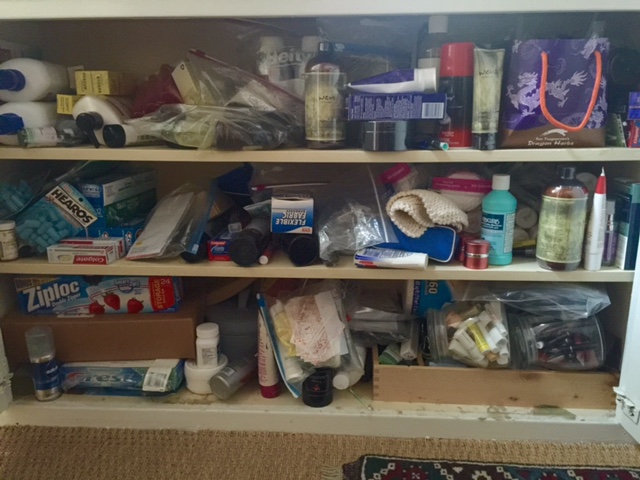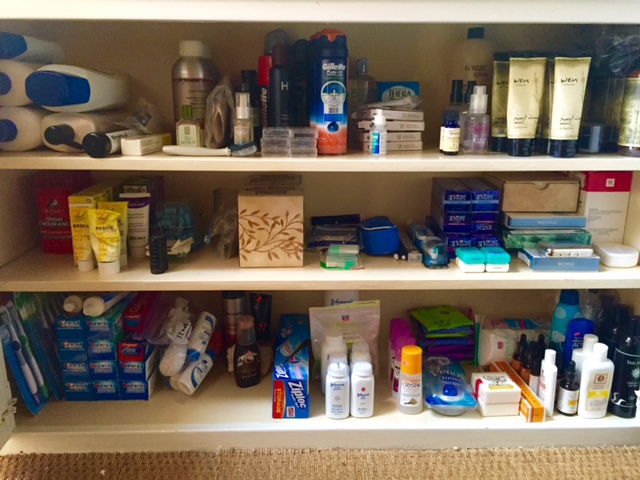I can't tell you how many times I'm working with a client, and we are organizing under the bathroom sink, and we find 10 tubes of toothpaste, 7 sticks of deodorant and multiple shampoos and conditioners. They start to get mad at themselves for letting their toiletry supply get out of hand. The truth is, it's hard not for it to get out of hand, and here's why...
First off, many people buy things in bulk. You may be one of those people. "But it was such a good deal" you say, as we are throwing out the oversized, expired containers of ketchup. Here's something to consider when buying at a wholesale/warehouse store: say you like tuna, and you eat it about once every one to two weeks, so you buy the package of 24 cans and get a great deal. But here's the rub: those cans will be in your pantry for the next 6-12 months. You may have the space for the tuna, but for larger bulk items this starts to max out the pantry in no time at all. For items with a shorter shelf life, you may be wasting your money in the long run, and for the average household, many sundries are unnecessary in bulk.
Solution - When buying in bulk, ask yourself how long it will take for you to consume the whole thing. Will it expire before you use it? Do you have the room to store it?
Example two: you receive monthly orders of hair and beauty products delivered right to your door. For instance, from my own personal experience is Wen hair products and Cindy Crawford Meaningful beauty. I remember being excited to start using these products, but come a few months later I was surrounded by enough cleansing conditioner and under eye cream to last me over a year. So I called to cancel and they did everything in their power to persuade me not to. After another month of smaller shipments, I finally stood my ground and canceled, knowing I could always start up again if I wanted to. However, some of my clients don't realize that they never canceled in the first place, and are still paying for and receiving products they don't use anymore. This extends beyond beauty products; another client had water delivered faster then they could drink it, and giant jugs were swallowing the living room. Don't forget about those magazines you're not reading. Sure, a magazine doesn't occupy that much real estate, but I bet I don't have to tell you that they stack up quick.
Solution - Keep like items with like items; that way you realize how much you have and how much you're using. If it's too much, then call and cancel the subscriptions. The convenience of automatic delivery is not always the best.
Common-clutter-maker #3: You don't know what you have, so you keep re-buying things you already own. You frantically search for something you know you probably have, but give up after 5 minutes and remember that Amazon Prime can get it in your hands the next day. I can't stress enough that everything in your home needs to have a home. When every item has its place, then the next time you need it, you can find what you're looking for in the first place you look. It may seem daunting, but go through ALL of your stuff; decide what to keep, what to donate and recycle/trash. Then choose the best home for your items, so the next time you need that specific hair tie or food dehydrating tray, you know right where it is. Pro tip: hiring a professional organizer can greatly alleviate the stress of de-cluttering your personal inventory. ;)
Solution - Find a home for everything in your home. This takes time but in the long run you will save yourself time, money and aggravation.
Lastly, and perhaps the hardest, you don't want to throw out something you paid a lot of money for, yet you don't like it and will never use again. It's hard for my clients to put that piece of clothing in the donation pile that still has the hefty price tag on it, or throw out the expensive makeup they only used once but wasn't their color. At the time of purchase it was a good idea, but now it is a good idea to get it out of your space. If you don't love it, lose it; whether you donate, recycle or sell it, you will not regret letting go of things that don't serve you.
Solution - Don't hold onto things because of their monetary value. Know that every item in your home holds energy, and items you don't love could be costing you a lot more then they're worth.
The silver lining to this is, while working with my clients during the de-cluttering stage of organizing, they start to visualize their spending habits vs. their consumption habits. After this, they are changed forever. Now, they make better decisions about what to buy in bulk; they know not to buy another white t-shirt because they know where the 7 they own live, and they can better choose what periodicals actually need to show up at their doorstep.
Stop the clutter before it starts.
Or start stopping the clutter.
Thanks for reading and happy organizing:)



